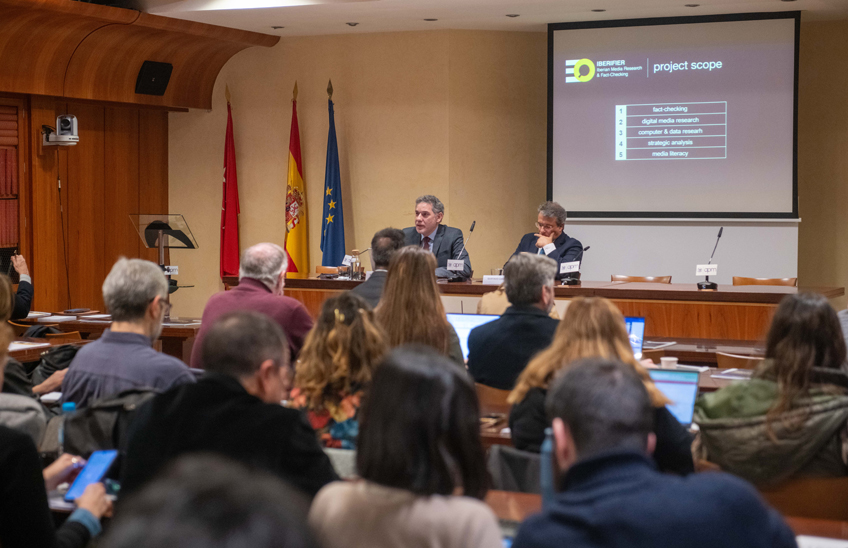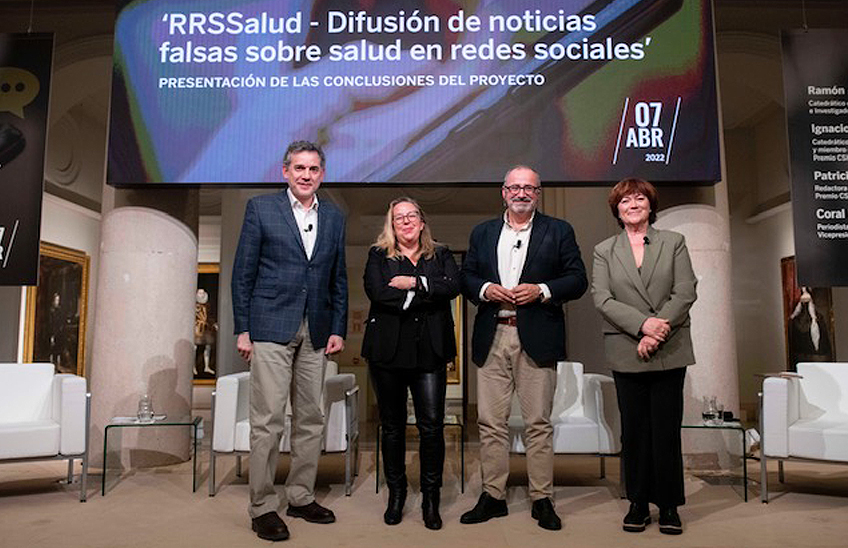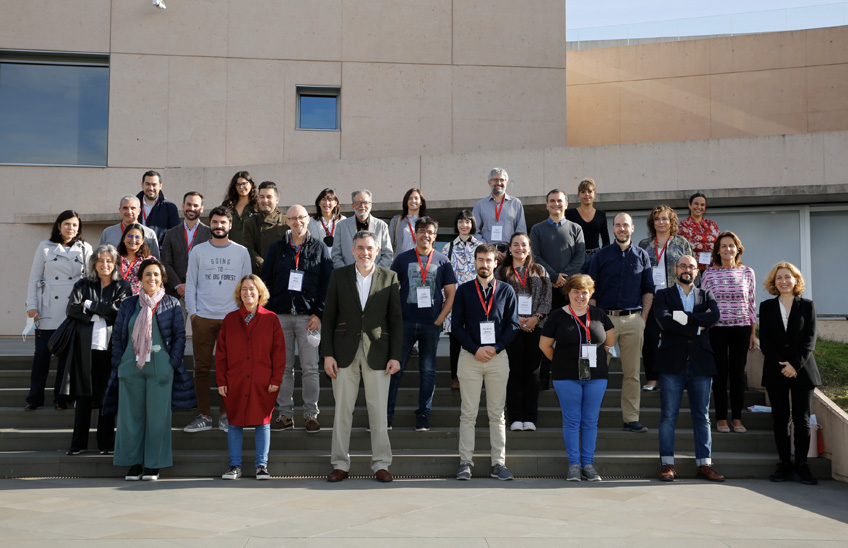Noticia_COM_23_06_2021_Digital_News_Report
Spaniards are committed to quality and proximity journalism to combat infodemics, according to the Digital News Report Spain 2021
Spain is one of the 46 countries analysed with the greatest social concern due to the disinformation surrounding the pandemic, especially due to hoaxes created by the government, politicians and political parties.

PhotoManuelCastells/Authors of report Digital News Report Spain 2021
23 | 06 | 2021
In the face of growing social concern about the hoaxes generated by politicians and distributed by networks and instant messaging, the journalistic brands of reference letter and proximity are erected as an information refuge for citizens, according to the report on information consumption Digital News Report, whose Spanish chapter is prepared by the University of Navarra together with the Reuters Institute of the University of Oxford, coordinator of the global report that analyses 46 countries this year.
With 67% of respondents concerned about disinformation, Spain is one of the countries analysed where social concern about this problem is highest (the average for all countries is 58%). More importantly, it is the country with the highest social concern (42%) about pandemic-related hoaxes created by the government, parties and national politicians (compared to an average of 27% of the 46 countries analysed). The majority (50%) say they are alarmed by misinformation circulating on social media and instant messaging applications.
The pandemic originated in 2020 has accelerated some of the trends that the Spanish media market had been dragging in recent years. Among them, the consolidation of traditional brands as quality news referents, the decline in the audience and profitability of printed newspapers, the enhancement of local and regional media, the use of cell phones as the most widely used device to stay informed, and the consolidation of the consumption of new news formats such as podcasts and news videos.
But COVID-19 has also halted or even reversed some attitudes or news consumption habits that seemed inevitable last year. For example, the loss of trust in the news has slowed its decline, television has not been overtaken by social networks as the most used medium for being informed, and paying for digital news has not taken off as one would expect after the intense promotional campaigns launched by the main news companies.
All these distinctive facts of the Spanish media market during 2020 have taken place in a general climate of infodemics (an overabundance of information, a mixture of true and false news), which has raised the concern of Spanish users about the proliferation of hoaxes, especially those generated by the government and other national politicians. Faced with this panorama, users have taken refuge in quality journalism and in local and regional news brands.
These are some of the conclusions drawn from data of the 8th edition of the Digital News Report Spain 2021, based on more than 2,000 surveys of Spanish Internet users. The report is part of the Digital News Report, the largest global study on news consumption, coordinated by the Reuters Institute of the University of Oxford, and of which the School of Communication of the University of Navarra has been an academic partner since 2014.
50% of respondents say they are alarmed by misinformation circulating on social networks and instant messaging applications.
About the survey Digital News Report and the report Digital News Report Spain
Digital News Report is a study by high school Reuters for the Study of Journalism based on a survey conducted by YouGov. The University of Navarra, sponsor and partner academic, is the author of the report Spanish Digital News Report Spain 2021 and manager of the interpretation of these data. The survey is based on an online panel from which a sample of over two thousand people (n=2019 in this edition), representative of the adult population connected to the internet, is taken, based on various demographic and socio-economic factors. The work fieldwork in Spain was carried out between 14 January and 5 February.
This year 2021 has covered 46 countries, of which 24 are European, 8 are American, 11 in Asia-Pacific and 3 in Africa; with respect to 2020, Colombia, Peru, Nigeria, India, Indonesia and Thailand have been added. For the first time, all the results include internet users who did not consume news in the last month, which in Spain accounted for 2.5% of the sample in this edition. This methodological change explains slight proportional decreases in various indicators of media consumption with respect to previous editions of survey.
The report Digital News Report Spain 2021, with dozens of graphs, is available in open access for enquiry and attribution. The study is part of the results of the project DIGINATIVEMEDIA - Cibermedios nativos digitales en España: caracterización y tendencias (ref. RTI2018-093346-B-C31) of the Programa Estatal de research and development+i Orientado a los Retos de la Sociedad, funded by the Spanish Ministry of Science, Innovation and Universities.
About the authors and @digitalunav
The authors of the report Digital News Report Spain 2021 are researchers associated with research center @digitalunav of the School of Communication of the University of Navarra and members of the Digital News average Research Group of the aforementioned School. The centre was founded in September 2013 with the mission statement aim of promoting research on the forms and impact of digital activity in the complex and changing field of communication.
More information about Digital News Research Group.
Authors:
Dr. Samuel Negredo. Associate Professor. department de average Projects. School de Comunicación. University of Navarra.
Dr. Elsa Moreno. Associate Professor. department de average Projects. School of Communication. University of Navarra.
Dr. Avelino Amoedo. Associate Professor. department de average Projects. School de Comunicación. University of Navarra.
Dr. Alfonso Vara-Miguel. Associate Professor. department de Marketing y Empresas de Comunicación. School de Comunicación. University of Navarra.
Dr. Jürg Kaufmann. Professor teaching assistant doctor. department de Marketing y Empresas de Comunicación. School de Comunicación. University of Navarra.





